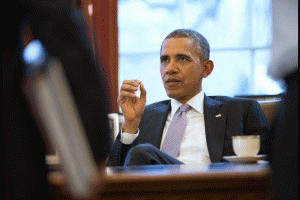This piece was reprinted by OpEd News with permission or license. It may not be reproduced in any form without permission or license from the source.
Source: Consortium News

President Barack Obama discusses Ukraine during a meeting with members of his National Security Staff in the Oval Office, Feb. 28, 2014.
(Image by (Official White House Photo by Pete Souza)) Details DMCA
Is "regime change" in Ukraine the bridge too far for the neoconservative "regime changers" of Official Washington and their sophomoric "responsibility-to-protect" (R2P) allies in the Obama administration? Have they dangerously over-reached by pushing the putsch that removed duly-elected Ukrainian President Viktor Yanukovych?
Russian President Vladimir Putin has given an unmistakable "yes" to those questions -- in deeds, not words. His message is clear: "Back off our near-frontier!"
Moscow announced on Saturday that Russia's parliament has approved Putin's request for permission to use Russia's armed forces "on the territory of the Ukraine pending the normalization of the socio-political situation in that country."
Putin described this move as necessary to protect ethnic Russians and military personnel stationed in Crimea in southern Ukraine, where the Russian Black Sea Fleet and other key military installations are located. But there is no indication that the Russian parliament has restricted the use of Russian armed forces to the Crimea.
Unless Obama is completely bereft of advisers who know something about Russia, it should have been a "known-known" (pardon the Rumsfeldian mal mot) that the Russians would react this way to a putsch removing Yanukovich. It would have been a no-brainer that Russia would use military force, if necessary, to counter attempts to use economic enticement and subversive incitement to slide Ukraine into the orbit of the West and eventually NATO.
This was all the more predictable in the case of Ukraine, where Putin -- although the bête noire in corporate Western media -- holds very high strategic cards geographically, militarily, economically and politically.
Unlike "Prague Spring" 1968
Moscow's advantage was not nearly as clear during the short-lived "Prague Spring" of 1968 when knee-jerk, non-thinking euphoria reigned in Washington and West European capitals. The cognoscenti were, by and large, smugly convinced that reformer Alexander Dubcek could break Czechoslovakia away from the USSR's embrace and still keep the Russian bear at bay.
My CIA analyst portfolio at the time included Soviet policy toward Eastern Europe, and I was amazed to see analysts of Eastern Europe caught up in the euphoria that typically ended with, "And the Soviets can't do a damned thing about it!"
That summer a new posting found me advising Radio Free Europe Director Ralph Walter who, virtually alone among his similarly euphoric colleagues, shared my view that Russian tanks would inevitably roll onto Prague's Wenceslaus Square, which they did in late August.
Past is not always prologue. But it is easy for me to imagine the Russian Army cartographic agency busily preparing maps of the best routes for tanks into Independence Square in Kiev, and that before too many months have gone by, Russian tank commanders may be given orders to invade, if those stoking the fires of violent dissent in the western parts of Ukraine keep pushing too far.
That said, Putin has many other cards to play and time to play them. These include sitting back and doing nothing, cutting off Russia's subsidies to Ukraine, making it ever more difficult for Yanukovich's successors to cope with the harsh realities. And Moscow has ways to remind the rest of Europe of its dependence on Russian oil and gas.
Another Interference
There is one huge difference between Prague in 1968 and Kiev 2014. The "Prague Spring" revolution led by Dubcek enjoyed such widespread spontaneous popular support that it was difficult for Russian leaders Leonid Brezhnev and Aleksey Kosygin to argue plausibly that it was spurred by subversion from the West.
Not so 45-plus years later. In early February, as violent protests raged in the Ukrainian capital of Kiev and the White House professed neutrality, U.S. State Department officials were, in the words of NYU professor emeritus of Russian studies Stephen Cohen, "plotting a coup d'état against the elected president of Ukraine."
We know that thanks to neocon prima donna Victoria Nuland, now Assistant Secretary of State for European Affairs, who seemed intent on giving new dimension to the "cookie-pushing" role of U.S. diplomats. Recall the photo showing Nuland in a metaphor of over-reach, as she reached deep into a large plastic bag to give each anti-government demonstrator on the square a cookie before the putsch.
(Note: You can view every article as one long page if you sign up as an Advocate Member, or higher).





